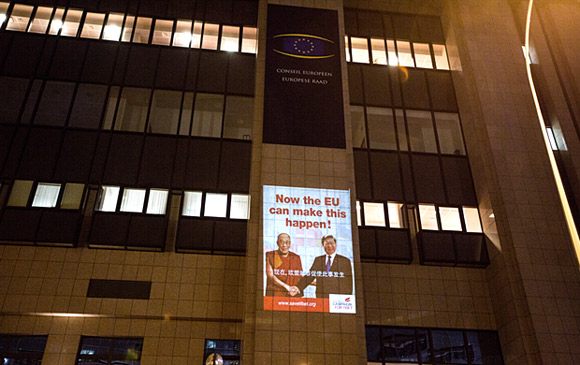New Nobel Prize Winner, the European Union, must address crisis in Tibet
The International Campaign for Tibet congratulates the European Union for being awarded the 2012 Nobel Peace Prize and for the recognition of the key role it has played in Europe and worldwide to promote peace, conflict prevention and conflict management.
On the occasion of the Peace Nobel Prize Ceremony, the International Campaign for Tibet projected on 10 December an image onto the EU Council building in Brussels of the Dalai Lama and Xi Jinping meeting in order to convey a strong message of the urgent need for such a meeting.

Video, photographs, and the projected slides are available here >>
Vincent Metten, EU Policy Director said: “This award gives the European Union even greater authority in its reconciliation and peace-building work and now it is time for this to be applied to the crisis in Tibet. A tragedy is unfolding across the Tibetan plateau as more than 90 Tibetans have set themselves in fire as a result of the anguish of oppression and separation from their exiled leader the Dalai Lama, a fellow Nobel Peace Prize Laureate. The EU must now strengthen its efforts to facilitate a resumption of the dialogue between the Tibetans and facilitate a meeting between the new Chinese leader Xi Jinping and the Dalai Lama.”
The European Union is joining an august body of laureates, including the Dalai Lama who received his award in 1989. Two years ago, the Chinese intellectual Liu Xiaobo was honoured with the same award but was unable to attend the ceremony as he was in prison in China. Detained since December 8, 2008, Liu Xiaobo was sentenced on December 25, 2009, to eleven years’ imprisonment and two years’ deprivation of political and is serving his sentence in a prison in Jinzhou, in Liaoning Province.
Twenty-three years after receiving his award, the 14th Dalai Lama is still waiting for the realization of his vision of peace and security for Tibet, where the situation is more acute today than it was in 1989. Sixty years of China’s failed policies in Tibet have led to a deepening crisis in Tibet with 92 Tibetans setting themselves on fire as they call for freedom and the return of their exiled leader the Dalai Lama. There has been no meeting between Chinese officials and representatives of the Dalai Lama since January 2010, the longest period since dialogue re-started between the two sides in 2002.
While the Chinese government has sought to downplay the situation, the self-immolations expose a crisis in the Beijing leadership’s Tibet policy. A new publication by the International Campaign for Tibet, ‘Storm in the Grasslands: Self-immolations in Tibet and Chinese policy’, published on December 10, reports that an almost daily frequency of self-immolations in recent weeks demonstrates a strong resolve among Tibetans to compel the new Chinese leadership to confront the policies and oppression that are the causes of these acts. The ICT report is available for downloading as an electronic PDF at www.savetibet.org.